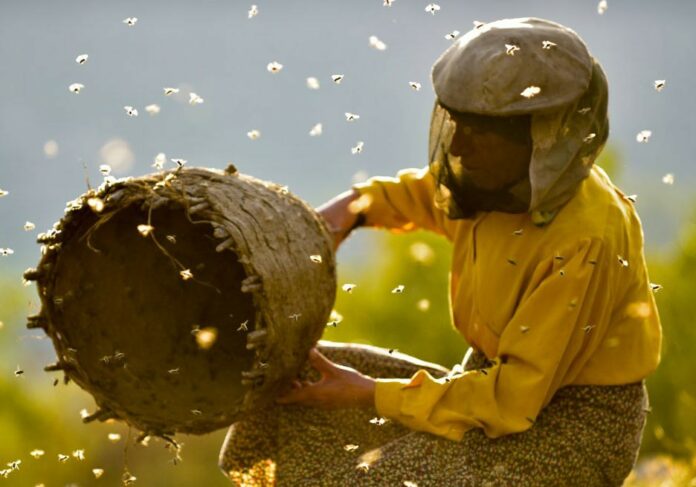Directors Tamara Kotevska and Ljubomir Stefanov spent three years filming the life of Hatidze Muratova. This lean, hard-working woman in her mid-50s practices an almost extinct craft: She’s a gatherer of wild honey in the vicinity of her deserted village.
This is an obscure corner of the Balkans, where it already looks as if it’s after the end of the world. The country is so little known that its name change didn’t make it into most reviews of Honeyland; as of last February, Macedonia is now known as the Republic of North Macedonia. Haditze gathers honey and tends her disfigured, slowly dying mother. She hikes up the narrow ledges of the hills and picks open the rocks, smoking the bees out with a dung-fired smoker. Haditze’s skills are such that she’s able to do this unveiled and barehanded, calming the bees by murmuring to them. They crawl on her fingers as if they were pets.
Her life is interrupted when new neighbors move into the village. The Sam family, mom, dad Hussein Sam, their seven or eight kids and several chickens, live inside their trailer. In all innocence, Haditze teaches dad how to gather honey, trusting that there’s enough for everyone.
Hussein mucks it up with overproduction, and by introducing aggressive, perhaps Africanized bees. Hussein’s kids are tough enough to deal with the half-wild cattle that kick them and knock them over. But they can’t deal with Hussein’s viciously stinging bees.
Hatidze trusted the filmmakers. Perhaps she was unclear on the concept of what movies are, living as she does in a stone-floored house without electricity or plumbing. And Kotevska and Stefanov honored Hatidze. Though from what we see, there is an open question of what was dramatized and what naturally appeared in front of the lens.
‘Honeyland’ is now playing at the Smith Rafael Film Center in
San Rafael.









